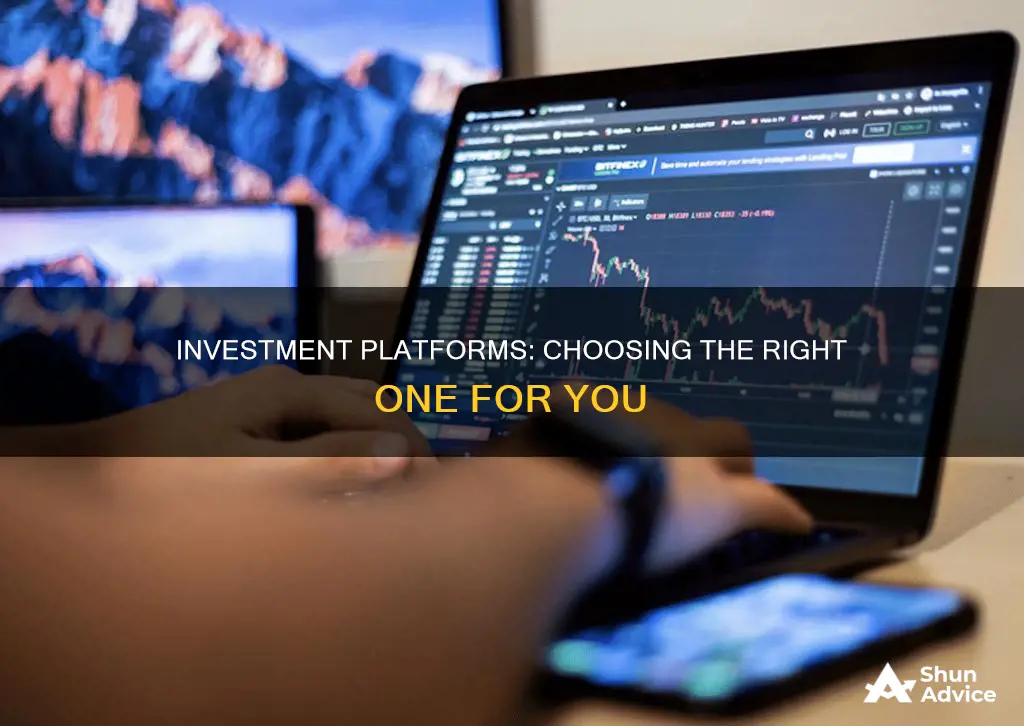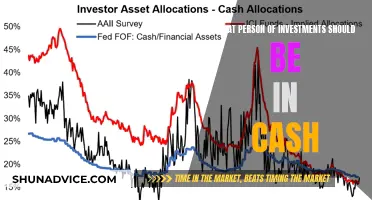
When you're looking to invest in stocks and shares, you need to decide which investment platform to use. There are several leading online investment fund platforms to choose from, all offering something different in terms of costs and services provided.
If you are simply looking for the cheapest investment platform, you can find articles that compare the costs of different platforms. However, it's important to remember that cheapest isn't always best. You need to think about a combination of price and service, and it's worth paying for quality.
- The range of investments offered by the platform.
- Whether you plan to invest on a regular monthly basis.
- Whether you will need help creating an investment portfolio.
- The investment tools offered by the platform.
- Whether you will want to deal or switch funds regularly.
- How much you are going to invest.
| Characteristics | Values |
|---|---|
| Cheapest platform | Freetrade* |
| Best for range of investments | Hargreaves Lansdown* |
| Best for monthly savers | Interactive Investor* |
| Best for model portfolios | Moneyfarm* |
| Best for tools and research | Hargreaves Lansdown* |
| Best for low dealing charges | Freetrade* |
| Best for small investors | Interactive Investor* |
| Best for large investors | Hargreaves Lansdown* |
| Best for US stocks | E*TRADE from Morgan Stanley |
What You'll Learn

Investment platform fees and charges
Platform Fees
Platform fees are similar to the cost of buying a carrier bag from a supermarket. Some platforms charge a flat fee, while others charge a percentage of the value of your holdings. Flat fees are usually preferable for larger investors, while percentage-based fees may be more suitable for active investors. It's essential to read the fine print and understand the charging structure before choosing a platform.
Fund Manager Fees
Also known as annual management charges, fund manager fees are paid to the manager of your investments. These fees vary depending on the fund and can range from 0.05% to 1% or more per fund. Some platforms may negotiate deals with fund managers to offer discounted fees.
Buying/Selling Fees
These are the costs incurred every time you buy or sell a fund or shareholding on the platform. These fees can range from £0 to £25 or more and may depend on the type of investment. If you plan on actively trading, look for platforms with low trading charges.
Transfer Fees
Transfer fees are charged when moving your investments from one platform to another. They are usually charged per fund, so the cost increases with the number of funds in your portfolio. However, you may have the option to sell your investments and transfer the cash, which is typically free but may incur trading charges.
Dividend Reinvestment Fees
Some platforms charge a fee for reinvesting dividends. This fee can vary, and some platforms may offer discounted rates for dividend reinvestment.
Regular Investment Fees
If you plan on investing a fixed amount regularly (e.g., monthly), some platforms offer lower dealing charges for regular investments. This can help reduce the overall cost of investing.
Other Fees
Other fees to consider include account opening fees, withdrawal fees, and inactivity fees. Some platforms may also charge for additional services, such as financial advice or access to premium features.
When choosing an investment platform, it's essential to consider your investment strategy, the types of investments you plan to hold, and the frequency of your trades. Different platforms cater to different types of investors, and understanding the fee structure can help you select the most cost-effective option for your needs. Remember to review your fees regularly to ensure you're getting the best deal.
Understanding Present Value Tables: A Guide to Smart Investing
You may want to see also

Investment platform tools and resources
Fidelity Investments
Fidelity Investments offers a wealth of educational resources and dependable customer service. Its Active Trader Pro platform is user-friendly and has many useful features for beginners. The platform offers fractional share trading, which makes it easier to trade with lower amounts of money, and features like market screeners and watchlist tools allow users to do their due diligence before picking investments. Fidelity also offers in-person support through 12 regional offices and more than 190 investor centres in the US.
Charles Schwab
Charles Schwab combines competitive fees, a powerful platform, and high-quality research and educational materials. Its client portal is easy to navigate, and customer support options are displayed prominently on every page. Schwab also provides the benefits of an extensive branch network across the US, where clients can schedule one-on-one sessions with a financial professional.
TD Ameritrade
TD Ameritrade has made nurturing and guiding new investors a top priority. It offers a well-rounded online broker platform, with ample resources that are especially good for beginners. The educational offerings range from in-person workshops to fully immersive curriculums, articles, videos and webcasts. TD Ameritrade also demonstrated excellent customer service in our tests, with a dedicated trade desk available to take user calls.
E*TRADE from Morgan Stanley
The Power E*TRADE platform is intuitive and effortless to navigate. Features within the charting area, like technical pattern recognition, are easy to implement. Users can launch live-streaming Bloomberg TV within the platform to stay on top of the latest news. E*TRADE also offers weekly educational webcasts on trading, with a focus on market commentary and trading strategies.
Robinhood
Robinhood's mobile app delivers on its promise to "democratize finance for all" by making it easier to access financial markets. The app's layout is minimalistic but peppered with useful features. Lists such as "100 most popular" and "top movers" help users stay on top of daily events, and news stories from major publications are available within the app. Robinhood also makes fractional share trading easy—users can elect to buy stock by a number of shares or by a dollar amount.
Webull
Webull stands out for its sleek, intuitive platform, which is reflected in its mobile app store scores. It's a good choice for beginner investors who prefer accessing their accounts and trading on their phone versus a desktop platform. Webull also delivers an impressive array of tools for active traders and a wide investment selection, including stocks (plus fractional shares), options, ETFs, crypto, commodities and futures.
Understanding the Investing Activities on a Cash Flow Statement
You may want to see also

Investment platform customer service
- Charles Schwab: Offers 24/7 phone support, text chat with live operators, and an extensive branch office network.
- Fidelity Investments: Provides reliable customer service with short wait times for phone calls and knowledgeable representatives. Also offers 12 regional offices and over 190 investor centres in the US.
- ETRADE from Morgan Stanley: Features an intuitive platform and educational content, including weekly educational webcasts on trading. However, customer service resources could be better.
- Robinhood: Known for its user-friendly interface and educational content, including a fun and informative newsletter and podcast. However, it was fined by regulators in 2019 for not following "best execution" practices, and it lacks phone customer service.
- Webull: Offers a sleek, intuitive platform and a high-interest rate on uninvested cash. However, crypto trading requires a separate app.
- J.P. Morgan Self-Directed Investing: Provides in-person customer support at Chase branches, but the trading platform is bare-bones and not suitable for advanced traders.
Cash App Investing: Are There Any Fees Involved?
You may want to see also

Investment platform ease of use
Investment platforms can be intimidating for beginners, but many platforms are designed to be easy to use and flexible as you grow your skills. Here are some factors to consider when choosing an investment platform for ease of use:
User-Friendly Interface
Look for a platform with a streamlined and intuitive interface that is easy to navigate. Robinhood, for example, has a minimalistic layout that is peppered with useful features, such as lists of popular stocks, top movers, and upcoming events.
Educational Resources
As a beginner, you'll want a platform that offers educational resources and guidance to help you make informed investment decisions. Fidelity, for instance, provides a wealth of educational content, including virtual courses, webcasts, and immersive courses.
Customer Support
It's important to have access to reliable customer support in case you need assistance. Look for platforms that offer multiple channels of communication, such as phone, email, and live chat. Fidelity, Charles Schwab, and E*TRADE are known for their responsive and knowledgeable customer service.
Mobile App
If you prefer accessing your investments on your phone, look for a platform with a well-designed mobile app. Webull, for example, stands out for its sleek and intuitive mobile app, which offers a wide range of tools for active traders.
Paper Trading
Paper trading allows you to practice trades without risking your real money. Charles Schwab's platform includes a paper trading feature, which is great for beginners who want to gain experience without the risk of losing money.
Low Fees
As a beginner, you may not want to be burdened with high fees. Look for platforms that offer low or no account fees, commission-free trades, and low minimum deposit requirements. Robinhood, for instance, has a $0 account minimum and offers commission-free stock, options, and ETF trades.
A Beginner's Guide to Investing via Binance
You may want to see also

Investment platform investment selection
Range of Investments
Different investment platforms offer access to different types of investments, such as stocks, bonds, funds, ETFs, and alternative investments. Choose a platform that offers a wide range of investment options to diversify your portfolio and maximise your investment potential.
Fees and Charges
Investment platforms typically charge various fees, including administration fees, fund management fees, and transaction fees. Compare the fee structures of different platforms to find one that aligns with your investment strategy and helps minimise costs.
Tools and Research
Look for platforms that offer a range of tools and research materials to aid your investment decisions. These can include portfolio-building tools, smartphone apps, market data, and analyst reports.
Regular Investing and Dividend Reinvestment
If you plan to invest on a regular monthly basis, consider platforms that offer discounted fees for regular investing. Also, look for platforms that offer dividend reinvestment options to maximise your returns.
Customer Service and Support
As a beginner investor, having access to reliable customer support is crucial. Choose a platform that offers multiple channels of communication, quick response times, and knowledgeable representatives who can guide you through the investment process.
Security and Regulation
Ensure that the investment platform you choose is regulated and complies with relevant financial regulations. This will help protect your investments and provide recourse in case of any issues.
User-Friendly Interface
Select a platform with an intuitive and user-friendly interface, especially if you are new to investing. A platform with a clean layout and easy-to-navigate features will make it easier for you to manage your investments effectively.
Remember, the best investment platform for you will depend on your individual needs and investment goals. Conduct thorough research, compare different platforms, and consider utilising the services of a financial advisor to make an informed decision.
A Beginner's Guide to Sofi Automated Investing
You may want to see also
Frequently asked questions
An investment platform is an online administration hub where you can buy and sell a range of investments. Investment platforms are often referred to as fund supermarkets because they allow you to buy from a range of different products (such as investment funds and shares).
There are a few questions you should ask yourself before choosing an investment platform. These include what you are planning to invest in, whether you want to invest on a regular monthly basis, and what investment tools you think you will need.
Hargreaves Lansdown and Interactive Investor are two investment platforms that offer a wide range of investments.
Freetrade and AJ Bell are two investment platforms that offer low dealing charges.
Hargreaves Lansdown and Interactive Investor are two investment platforms that offer a range of tools and research to help you create portfolios.







